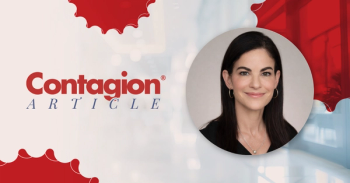
Discussing HIV Drug Resistance With Patients
Thought leaders discuss when and how to approach drug resistance and steps to ensure long-term treatment success.
Episodes in this series

Joseph Eron, MD: One of the things that came up in the discussion for this program is, when you have someone who's starting on therapy—like in San Francisco, they're diagnosed that day—do you discuss development of resistance as something they should worry about? Or do you not?
Daniel R. Kuritzkes, MD: We do. When we start people, typically we have people referred to us for treatment start. We're now at a testing center. So there are people who have tested positive someplace else and they get referred to us for care. Part of our intake interview with the patients includes, in addition to explaining all about what HIV is, what it means for them, and especially pointing out that treatment is now very different than it used to be. We do discuss the importance of once started on therapy to continuously take your treatment because of the risks of resistance. This isn't like taking medicine for blood pressure or diabetes where if you stopped for a couple of day’s you'd be OK. Here you could really get into trouble and spoil the effectiveness of future regimens.
Joseph Eron, MD: Monica, what is your approach?
Monica Gandhi, MD, MPH: Yes. We also do that on the first day. I know it's a lot to take in, especially if we're doing rapid ART [antiretroviral therapy]. But our aim is 7 days a week. And our aim became intensified around 7 days a week. You may not be able to achieve– well, you will be able to achieve their life suppression with less, but we were actually very taken by the data on inflammation with suboptimal adherence but still having virologic suppression from Dr Jose Castillo-Mancilla and others. With that, we want perfect adherence. I have really changed my mind on that because of inflammation. So, we are aiming for 7 days.
Joseph Eron, MD: Yeah, I agree on that. I tend not to focus on the resistance aspect, though. I've had some patients come back to me with anxiety about missing a medication. Will they become resistant, and is my medicine ever going to stop working for me? It may be my own personality. I tried telling the upside of the thing. If you take your pills every day, I can pretty much guarantee you should stop smoking. Because that's what's going to kill you. But I get it. There's a balance and I do certainly talk about it over time, but different people do things in different ways. Monica, you really have your hands on things, which is really terrific. Can you talk about steps that your practice takes to kind of guarantee long-term success? Access, adherence, communication. What are some of the things that your team does? I know you're so organized.
Monica Gandhi, MD, MPH: We are lucky to have an excellent team. But I think part of that excellence is the Ryan White CARE Funding that has been so incredibly important for wraparound care in low-income clinics like ours. We have the social workers and we have case managers. The thing that has really helped, especially when we start a regimen, is to have them come back quite quickly. It used to be that it would take a while for the viral load to come down, but INSTIs [Integrase strand transfer inhibitors] have really changed all that. Now we do expect essentially this 1-log reduction, at least, by 10 days. We really expect that we need to see that.
So we bring them back very quickly after the first time and then we do, if we have to, a lot of adherence aid devices. The pill boxes, many of our pharmacies will deliver directly the bubble packs so that you can really tell how you're taking it. We do have homeless patients and there are lockers in San Francisco, places that people can store their things when they're in tents. Because medications can actually be stolen with the hopes that there's something else in there. So we do a lot in terms of adherence counseling and adherence monitoring. Of course, our main adherence-monitoring tool is viral loads and we're lucky to have the ability to monitor viral loads in our setting.
Joseph Eron, MD: Dan, different things in your setting?
Daniel R. Kuritzkes, MD: No. We're fortunate to have social workers as well. They play an absolutely essential role in helping our patients through all sorts of challenges. Of course, like Monica said, we use virus load as our adherence tool for monitoring purposes. Then we help our patients with pillboxes and the like.
Joseph Eron, MD: In Chapel Hill, we have a substantial distance population. Some of it is rural. The average distance to our clinic is 60 miles. One of the things that changed, and really made a huge difference, was the specialty pharmacies that will ship medication to people's homes or wherever they live. There was this stigmatization that you talked about, Monica, of people going to a local pharmacy. They would drive back to Chapel Hill just to pick up their medicine, and then if they don't have a car or they don't have gas, it didn't get picked up. There was actually legislation in North Carolina that favored local pharmacies. That had to be overcome in order to allow central shipping from some of these specialty pharmacies. That was a while ago, but it has made a big difference. Some people have found wonderful local pharmacists, and we know who those pharmacies are and they'll partner with them. I've patients whose lives were saved by a pharmacist that took the time to put the pills in a pillbox.
Monica Gandhi, MD, MPH: Pharmacists are our best friends in HIV. They are amazing.
Joseph Eron, MD: The specialty ones and the ID [infectious diseases]-trained ones. Finding ones in the community that are committed really makes a big difference.
Monica Gandhi, MD, MPH: So do drug-drug interactions in that setting. Also, when we don't use specialty pharmacies or those pharmacies kind of known in the city for knowing HIV there can be problems. We've had ritonavir left out with darunavir. I think the knowledge base has to be there in the HIV clinician, I think it has to be there in the HIV pharmacist.
Joseph Eron, MD: I bet In San Francisco, the kind of knowledge base of pharmacists is quite high.
Monica Gandhi, MD, MPH: Increasingly less because of fewer diagnoses, so that's why we send them to certain pharmacies that we consider the best.
Transcript Edited for Clarity
Newsletter
Stay ahead of emerging infectious disease threats with expert insights and breaking research. Subscribe now to get updates delivered straight to your inbox.


































































































































